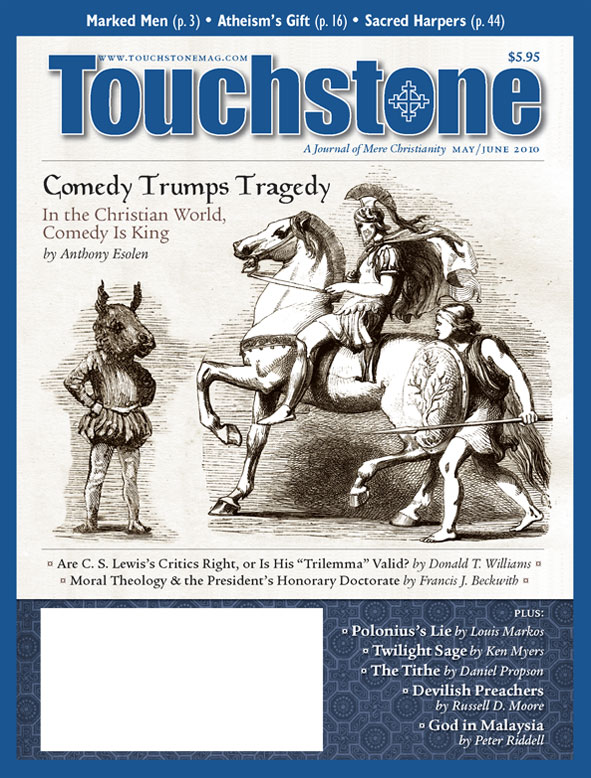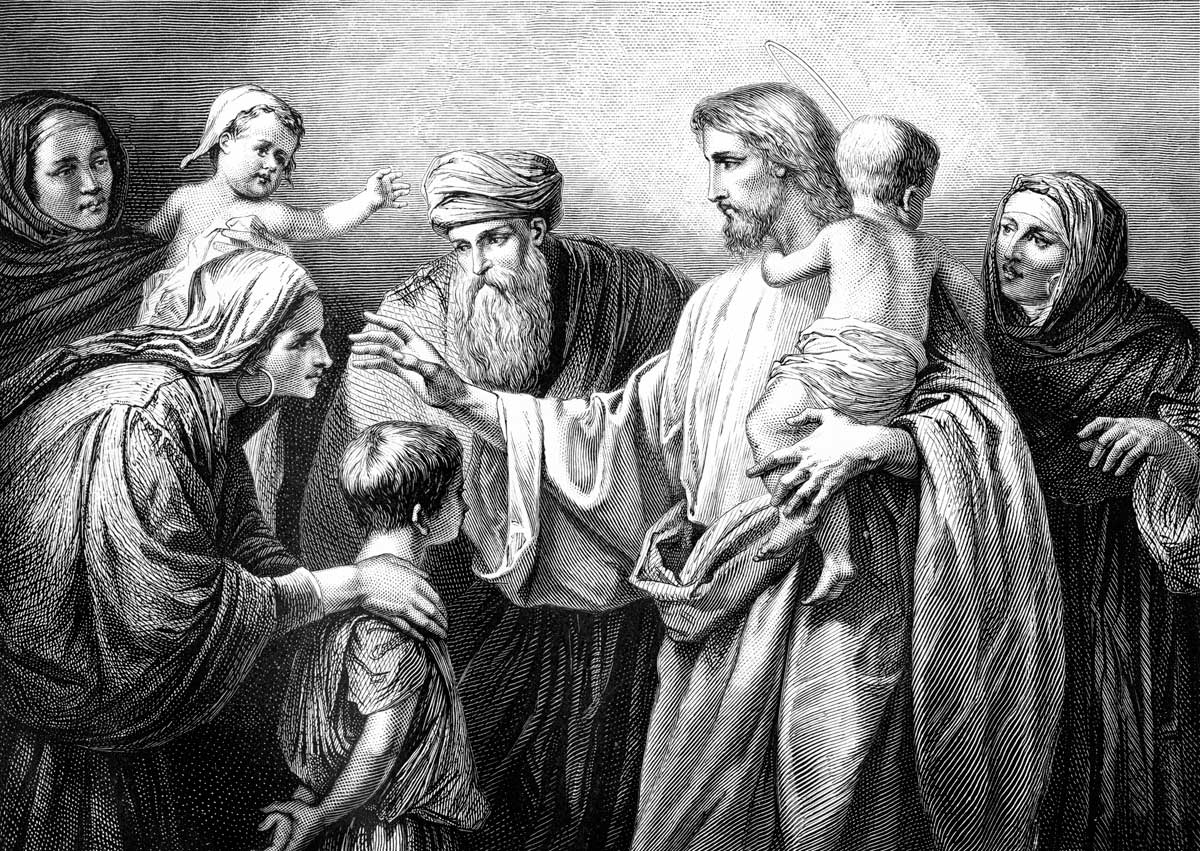Justice for Some
Moral Theology & the President’s Honorary Doctorate
by Francis J. Beckwith
Several years ago, after a pick-up basketball game, I got into a discussion with one of my teammates about a book I was reading on the Christian philosophy of religion. When I mentioned that the book claimed that a Christian may have rational warrant for his theological beliefs, my teammate, a committed believer in reincarnation, responded, “That may be true for you, but that’s not true for me.”
Puzzled by that response, I replied, “Is it true for both of us, or just true for you, that what may be true for me is not true for you?” Quickly losing confidence in his coffeehouse aphorism, he said he didn’t think it right that I was trying to push my religion on him.
I, of course, was suggesting that he was trying to push his religion, in particular, his religious epistemology, on me. For he was maintaining, whether he realized it or not, that in matters of religious epistemology, there is only one correct position, namely, that one’s theological beliefs can never rise to the level at which one may have warrant to call such beliefs “knowledge.” In other words, under the guise of openness and tolerance, he was, without my consent, dictating the epistemological terms under which I could announce my religious beliefs to others.
Belief & Knowledge
I suggest that the controversy surrounding President Barack Obama’s commencement address at the University of Notre Dame on May 17, 2009, manifested a conflict between two different understandings of the epistemological status of theological beliefs. On one side is the view that the deliverances of dogmatic and moral theology are integral parts of a knowledge tradition that may inform, and be informed by, all the disciplines in the academy. On the other side is the view that all theological claims are either church- or person-relative, and thus ineligible grounds for political action or public moral judgment.
For those who hold the second view, theology may never properly be described as knowledge, though it may be given the amorphous label “deeply held personal belief” or something similar. This cast of mind was manifested in the comments of 2004 Democratic presidential candidate John Kerry, a Catholic who believes that human life begins at conception but does not think this belief should be reflected in our laws. This is because a “belief,” in this philosophical taxonomy, doesn’t count as an item of knowledge that may defeat the deliverances of another person’s equally subjective “belief.”
Thus Senator Kerry could scold Pope John Paul II for “crossing the line” when a document issued by the Vatican suggested that Catholic politicians like Kerry should not support legislation allowing homosexual unions because “to vote in favor of a law so harmful to the common good is gravely immoral.” Kerry, in his reply, offered the requisite affirmation of faith—“I believe in the church and care about it enormously”—followed by the requisite disclaimer that it is, after all, just religion and has nothing important to say about anything of consequence—“But I think that it’s important to not have the church instructing politicians.” (Apparently, however, politicians may instruct the church about what it should consider important.)
It is this cast of mind that finds it difficult to believe that anyone not motivated by partisanship or unconscious bigotry would find it objectionable that the University of Notre Dame would award an honorary doctorate to a President of the United States who does not share the university’s “deeply held belief.” My goal is to explain why this cast of mind is mistaken.
Not Mere Opinion
As a Catholic university, the University of Notre Dame affirms the truth of Catholic moral theology, including what that theology has to say about liberty, community, and the dignity of the human person. According to Catholic moral theology, a regime that sequesters a group of human beings from the protection of its laws for capricious and gravely immoral reasons is a regime whose laws on this matter are not really laws at all.
In fact, we need not even consult a Catholic theologian to receive clarity on this question. We can cite Dr. Martin Luther King, Jr., a Baptist minister, in his “Letter from a Birmingham Jail” of April 16, 1963, in which he wrote:
I would agree with St. Augustine that “an unjust law is no law at all.” Now, what is the difference between the two? How does one determine whether a law is just or unjust? A just law is a man made code that squares with the moral law or the law of God. An unjust law is a code that is out of harmony with the moral law. To put it in the terms of St. Thomas Aquinas: An unjust law is a human law that is not rooted in eternal law and natural law. Any law that uplifts human personality is just. Any law that degrades human personality is unjust.
According to Catholic moral theology, the unborn human being, from the moment of conception, is a full-fledged member of the human community, entitled to all the rights due a person as a person, because he is in fact a person. Catholics, and others who hold this view, not only believe this, but they believe it is true and that they know it is true.
This means that, for them, the personhood of an unborn child is not a matter of taste, preference, “deep concern,” or “personal belief.” It is a belief they are convinced they know is true, just like other beliefs they are convinced they know are true, such as that Julius Caesar crossed the Rubicon, that it is wrong to torture children, that Mother Teresa was morally better than Adolf Hitler, and that the Earth is the third planet from the Sun.
A Consistent Public Record
President Obama vigorously opposes this understanding of the true breadth of the human community. From the time he was an Illinois state senator, through the early days of his administration, right up to the time he was invited to Notre Dame and beyond, he has employed his considerable talents to advocate for the exclusion of prenatal human beings from the protection of our laws. He has a consistent and unbroken public record on the matter, from which I need cite only a few examples:
While in the Illinois legislature he opposed a bill that would have required medical assistance to be given to children who survived abortions. While in the US Senate, he vocally disapproved of the Supreme Court’s upholding of the federal ban on partial-birth abortion. During his presidential campaign, he affirmed his desire to repeal the Hyde Amendment and promised to sign the federal Freedom of Choice Act (FOCA), which would eliminate virtually all federal and state restrictions on abortion, as well as conscience clauses protecting pro-life medical personnel from being forced to participate in abortions. Once president, he lifted the ban on federal funding of embryo-destructive research and rescinded the Mexico City policy, which prohibited US funds from being used to promote abortion internationally.
I am confident that Notre Dame would never bestow an honorary doctorate in science on an astronomer who vigorously advanced the theory of geocentricity, or to a chemist who refused to teach his students the periodic table. Nor would it award an honorary doctorate in divinity to a theologian who was an unrepentant apologist for racial apartheid and white supremacy. Why, then, did it bestow an honorary doctorate of laws on someone who, for his entire public life, has enthusiastically fought to keep the unborn permanently outside the protections of the law?
Compromised Identity
If a Christian university is to remain true to its identity, it must recognize that the truth it claims to know in dogmatic and moral theology matters as much as, if not more than, the deliverances and insights of the other disciplines in the academy, such as law, business, chemistry, physics, or art history.
Ironically, if Notre Dame had played its cards right, it could have honored President Obama without compromising its Catholic identity: It could have invited him to give the commencement address without offering him an honorary degree. If the president had accepted this invitation, reporters would no doubt have noticed that every other president who had given a commencement address at Notre Dame had also been awarded an honorary doctorate. Press inquiries to the university would soon have followed.
And the university president, with complete moral integrity, could have said something like this: “Although we respect and honor President Obama’s historic election as well as his accomplishments, we cannot award him an honorary doctorate in laws since he is actively engaged in making sure that a large segment of the human community, the unborn, are permanently sequestered from the protection of the laws. This, of course, does not mean that we do not respect his office and the many possible ways in which Catholics may work with the president on a variety of issues and common causes. Because we know that President Obama respects Catholics and Catholic moral theology, we are convinced that he understands, appreciates, and respects our stance.”
This would have made it nearly impossible for either the right or the left to cry foul. It would have put Obama in an awkward position, but if he really wanted to dialogue with those with whom he disagrees, he could hardly have made it a condition of that dialogue that his hosts remain silent and administratively impotent regarding the veracity of their own fundamental principles.
Diminishing Language
Now I would like to discuss a portion of President Obama’s commencement address that, although it has been applauded by many of his Catholic and Evangelical supporters, I believe expressed a misunderstanding of the pro-life position—a misunderstanding that may serve to diminish the moral seriousness of the effort to protect unborn persons, which the pro-life movement has fought hard to communicate for several decades now.
In his address, Obama said that, on the issue of abortion, we should strive for common ground, since, “no matter how much we may want to fudge it . . . at some level, the views of the two camps are irreconcilable.” This is certainly true, and thus, one who does not share the president’s view on abortion should not fault him for reaching out to those with whom he disagrees.
Nevertheless, I believe the president’s call for common ground should not be confused with a pro-life understanding of humanity’s wideness. Here are the president’s words from his speech:
So let’s work together to reduce the number of women seeking abortions by reducing unintended pregnancies, and making adoption more available, and providing care and support for women who do carry their child to term. Let’s honor the conscience of those who disagree with abortion, and draft a sensible conscience clause, and make sure that all of our health care policies are grounded in clear ethics and sound science, as well as respect for the equality of women.
The president chose his words carefully. Let’s begin with the second sentence. He tells us that people “disagree with abortion,” though that’s not quite right. Pro-lifers don’t condemn abortion because they disagree with it; they think abortion is unjustified homicide. It’s hard to imagine President Obama saying that he “disagrees with” spousal abuse, genocide, or racial discrimination. He would say that these things are categorically wrong; thus, it would diminish the seriousness of his convictions for us to cast his judgments in language that makes it sound as if he is merely being contrary. Likewise, by framing pro-lifers’ objection to abortion as a subjective opinion rather than as a serious moral judgment they believe to be true and universal, the president diminished the pro-life conscience he calls for us to honor.
A Common Aspiration?
However, I want to focus on Obama’s suggestion that both sides “work together to reduce the number of women seeking abortions.” Read superficially, this is a laudable sentiment. In fact, it is similar to sentiments expressed by many of Obama’s Catholic and Evangelical supporters, who claimed that it was precisely on such grounds that a pro-lifer could vote for him. Consider, for example, comments by Douglas Kmiec about a meeting he and other religious leaders had with Obama during the 2008 campaign:
The discussion dwelt at some length on abortion. . . . Describing the abortion decision as a “difficult, deeply moral one,” Obama sees it as one only the woman can make. Unless her choice affirms life that is not my Catholic view, and I told him so. But disagreement or not, it is abundantly clear from our conversation that Obama shares a common aspiration to reduce the incidence of abortion.
How? Obama is committed to encouraging “responsible sexual behavior,” discouraging unwanted pregnancies, promoting adoption as a more viable, affordable and appealing option than it presently is, and putting off limits in a manner consistent with the law as the justices see it, late-term abortion. Obama will not exclude abortion from medical coverage to fulfill a health exception “rigorously defined.”
So despite Obama’s record, pro-life Catholics and Evangelicals like now-Ambassador Kmiec supported the president’s candidacy on the grounds that his policies would reduce the number of abortions. Although University of Alabama professor Michael New has provided convincing refutations of the empirical claims made by Obama’s self-identified pro-life supporters, I want to respond to what I believe is the philosophical mistake that lurks behind their argument.
Principle versus Mere Reduction
While pro-life activists have worked tirelessly over the years to reduce the number of abortions, a numerical reduction is not the point of their activism. The point is that all members of the human community, including the unborn, are entitled to the protection of the laws. “Reducing the number of abortions” could occur in a regime in which this principle of justice is denied, and that is the regime that President Obama wants to preserve and extend.
This is a regime in which the continued existence of the unborn is always at the absolute discretion of those who possess the power to decide to kill them or let them live. Reducing the number of these discretionary acts of killing simply by trying to pacify and/or accommodate the needs of individuals who otherwise would procure or encourage abortion only reinforces the idea that the unborn are subhuman creatures whose value depends exclusively on someone else’s wanting them or deciding that they are worthy of being permitted to live. So, in theory at least, there could be fewer abortions while the culture and the law become increasingly unjust.
Consider this illustration. Imagine two men in nineteenth-century America having a discussion about reducing the number of slaves. One man says he is not interested in giving slaves full citizenship, but he would like to see a reduction in the number of people brought to this country to be slaves. The other man says that he, too, wants to reduce the number of slaves, but he proposes to do it by freeing the slaves and giving them the full citizenship to which they are entitled as a matter of natural justice.
Which man is really “against slavery” in a principled sense? The first wants to reduce the number of slaves, but only while retaining a regime of law that treats an entire class of human beings as subhuman property. The second believes that the juridical infrastructure should be changed to reflect the moral truth that slaves are human beings made in the image of God, who by being held in bondage are denied their fundamental rights.
Just as calling for a reduction in the number of slaves is not the same as believing that slaves are full members of the human community, so, too, calling for a reduction in the number of abortions is not the same as believing that unborn babies are full members of the human family—regardless of their size, level of development, environment, or dependency.
Confidence in the Truth
Ultimately, it seems that President Obama’s receiving an honorary doctorate from Notre Dame is a symptom of a deeper problem in Christian academic institutions: a widespread loss of confidence in theological truth. This loss is the result of Christian institutions’ uncritically assimilating the dominant assumptions of modern culture, one of which is that theological traditions, and the moral principles deeply connected to them cannot be real and trustworthy sources of knowledge and so have no place in policy debates.
For Christians, resisting this epistemological apartheid will come at a price. A bold and confident propagation of what they believe is true will put Christians at odds with those who have the influence and power to dispense prestige and authority in our culture. But no matter—those who serve the truth will garner a far better and more lasting reward.
Francis J. Beckwith is Professor of Philosophy and Church-State Studies at Baylor University. His most recent book is Politics for Christians: Statecraft as Soulcraft (InterVarsity Press, 2010). His writing can be found at www.francisbeckwith.com.
subscription options
Order
Print/Online Subscription

Get six issues (one year) of Touchstone PLUS full online access including pdf downloads for only $39.95. That's only $3.34 per month!
Order
Online Only
Subscription

Get a one-year full-access subscription to the Touchstone online archives for only $19.95. That's only $1.66 per month!
bulk subscriptions
Order Touchstone subscriptions in bulk and save $10 per sub! Each subscription includes 6 issues of Touchstone plus full online access to touchstonemag.com—including archives, videos, and pdf downloads of recent issues for only $29.95 each! Great for churches or study groups.
Transactions will be processed on a secure server.
more from the online archives
calling all readers
Please Donate
"There are magazines worth reading but few worth saving . . . Touchstone is just such a magazine."
—Alice von Hildebrand
"Here we do not concede one square millimeter of territory to falsehood, folly, contemporary sentimentality, or fashion. We speak the truth, and let God be our judge. . . . Touchstone is the one committedly Christian conservative journal."
—Anthony Esolen, Touchstone senior editor









